Hasegawa 1/32 Bf-109F-2
|
KIT #: |
|
|
PRICE: |
|
|
DECALS: |
Two Options |
|
REVIEWER: |
Tom Cleaver |
|
NOTES: |
Base
kit is Bf-109F-6/U (special release) |
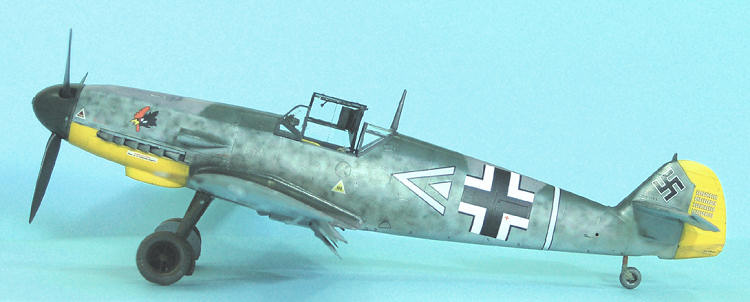
The Bf‑109F, or Friedrich, is commonly considered the
high point
of development of the airframe technically, in terms of mating power to airframe
for maximum performance. Pilots
considered it the best‑handling of all the 109s; the later Gustav and
Kurfurst series did not increase performance for the extra weight of
armament and different engines. It
is certainly the best‑looking Bf‑109 overall.
The Bf-109F-0 first appeared in limited numbers on the Channel Front in
November 1940, while the later Bf-0109F-2 equipped the two Jagdgruppen on the
Channel Front, Jg 26 and JG 2 during the spring and summer of 1941.
The Friedrich canceled the performance edge of the new Spitfire V
over the Bf‑109E, allowing the Luftwaffe to maintain air superiority against the
RAF over the Channel and
Northern France
during the “Non‑Stop Offensive” of 1941.
Hans “Assi”
Hahn:
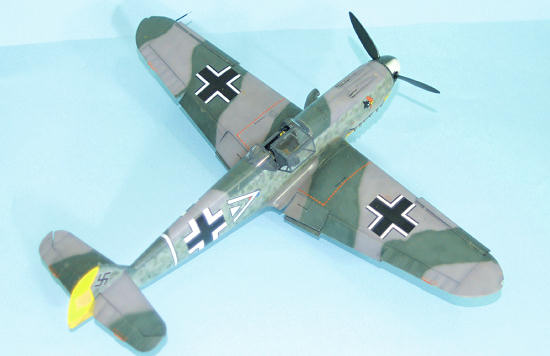 Hans “Assi” Hahn enlisted in the army on
April 1, 1934
as an officer candidate, and was promoted to Unteroffizier on December 1
of that year. After attending the Kriegsschule at München from January to
October 1935, Hahn was promoted to Oberfähnrich on October 1.
That November, Hahn transferred from the infantry to the Luftwaffe,
and took pilot training at
Celle.
He was promoted to Leutnant on
April 1, 1936,
and was assigned to 4./JG 134, based at Werl near
Dortmund
until he was transferred to the Jagdfliegerschule at Werneuchen as an
instructor in October 1937, being made Staffelführer of 1. Staffel.
He was promoted to Oberleutnant on
February 1939 and was transferred to the Stabstaffel of I./JG 3.
Oberleutnant Hahn was assigned JG 2 Richtofen on October 11, 1939
and assigned to the newly formed II./JG 2, based at Zerbst. On
December 15, 1939,
he was appointed Staffelkapitän of 4./JG 2. Hahn claimed his first two
victories over RAF Hurricanes on
May 14, 1940,
in his first engagement with enemy aircraft, though only one claim was
confirmed. He scored a total of 5 during the
Battle
of
France
and was particularly successful in the
Battle
of
Britain,
claiming three Spitfires shot down
on August 31, 1940. After claiming his 20th victory on
September 20, 1940,
he was awarded the Ritterkreuz.
Hans “Assi” Hahn enlisted in the army on
April 1, 1934
as an officer candidate, and was promoted to Unteroffizier on December 1
of that year. After attending the Kriegsschule at München from January to
October 1935, Hahn was promoted to Oberfähnrich on October 1.
That November, Hahn transferred from the infantry to the Luftwaffe,
and took pilot training at
Celle.
He was promoted to Leutnant on
April 1, 1936,
and was assigned to 4./JG 134, based at Werl near
Dortmund
until he was transferred to the Jagdfliegerschule at Werneuchen as an
instructor in October 1937, being made Staffelführer of 1. Staffel.
He was promoted to Oberleutnant on
February 1939 and was transferred to the Stabstaffel of I./JG 3.
Oberleutnant Hahn was assigned JG 2 Richtofen on October 11, 1939
and assigned to the newly formed II./JG 2, based at Zerbst. On
December 15, 1939,
he was appointed Staffelkapitän of 4./JG 2. Hahn claimed his first two
victories over RAF Hurricanes on
May 14, 1940,
in his first engagement with enemy aircraft, though only one claim was
confirmed. He scored a total of 5 during the
Battle
of
France
and was particularly successful in the
Battle
of
Britain,
claiming three Spitfires shot down
on August 31, 1940. After claiming his 20th victory on
September 20, 1940,
he was awarded the Ritterkreuz.
On
October 29, 1940,
Hahn was promoted to Hauptmann and appointed Gruppenkommandeur of
III./JG
2. By the end of 1940, his victory total had reached 22. Hauptmann Hahn
became the 32nd German soldier awarded the Eichenlaub on
August 14, 1941
for scoring 41 victories. He recorded his 50th victory on October 13, 1941 and
his 60th on May 4, 1942. Hahn's 66th, and last, victory over the Western front
was a RAF Spitfire fighter shot down on
September 16, 1942.
This kit is a limited run modification of the previously-released
Bf-109F-4 kit. A separate sprue
includes the necessary parts to do either of the two Bf-109F-6/U aircraft
specially built for Adolf Galland, one with two 13mm machine guns in the
cowling, the
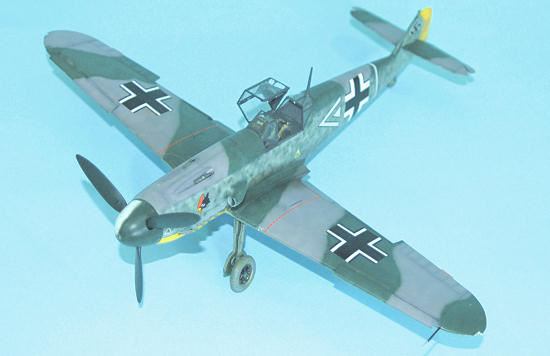 other
with two 20mm MG-FF cannon in the wings, as well as the shallow radiator for the
early Bf-109F. This is the first
time any manufacturer has given modelers the opportunity to create these two
interesting airplanes in 1/32 with parts supplied in the box.
(Hasegawa also released this in 1/48. Ed) As with the
earlier release, it includes the more accurate spinner and more detailed
exhausts, as well as detailed parts for the interior of the windscreen and
canopy.
other
with two 20mm MG-FF cannon in the wings, as well as the shallow radiator for the
early Bf-109F. This is the first
time any manufacturer has given modelers the opportunity to create these two
interesting airplanes in 1/32 with parts supplied in the box.
(Hasegawa also released this in 1/48. Ed) As with the
earlier release, it includes the more accurate spinner and more detailed
exhausts, as well as detailed parts for the interior of the windscreen and
canopy.
Unfortunately, the decals appear to be some printing modification of the
earlier decals for Galland's Bf-109E-4, and are thus printed in the “ivory”
white that modelers have come to loathe.
Given that I had already done one version of Galland's “specials,” this
fact led me to decide to do a Bf-109F-2 and use aftermarket decals.
I decided to do Hahn's second Bf-109F-2 when I realized that the markings
provided by Trumpeter in their alleged Bf-109F kit were correct for this
airplane (I had previously discounted these decals since they did not work for
Hahn's more well-known first F-2, with the overall yellow cowling).
In the end though, I have to say that if you want to do this airplane you
should invest in Eagle Decal's EC-51 sheet, which has all of Hahn's Bf-109Fs on
it and gives you superior decals to work with.
If you've built one of the idiot-proof 1/32 Hasegawa 109s the process
here needs no further instruction.
The kit is impossible to assemble incorrectly unless you go out of your way to
deliberately screw the pooch. I
used an old set of resin seatbelts done by Cutting Edge that I found on the
lower level of the aftermarket stuff dungeon.
 While the new exhausts look more accurate when completed, be certain
before gluing them on the backing plate that you have that plate right for the
side they will ultimately go on.
It's easy if you don't check that to have two done for the same side, which
creates a problem when you have to disassemble it after letting the subassembly
set completely (ask me how I know).
I personally dislike these separate exhausts Hasegawa does, because on all their
kits (most particularly the P-40s) the attachment tabs are way too small, making
it real easy to pop them off, and they are almost always considered a delicacy
by the carpet monster, for immediate eating.
While the new exhausts look more accurate when completed, be certain
before gluing them on the backing plate that you have that plate right for the
side they will ultimately go on.
It's easy if you don't check that to have two done for the same side, which
creates a problem when you have to disassemble it after letting the subassembly
set completely (ask me how I know).
I personally dislike these separate exhausts Hasegawa does, because on all their
kits (most particularly the P-40s) the attachment tabs are way too small, making
it real easy to pop them off, and they are almost always considered a delicacy
by the carpet monster, for immediate eating.
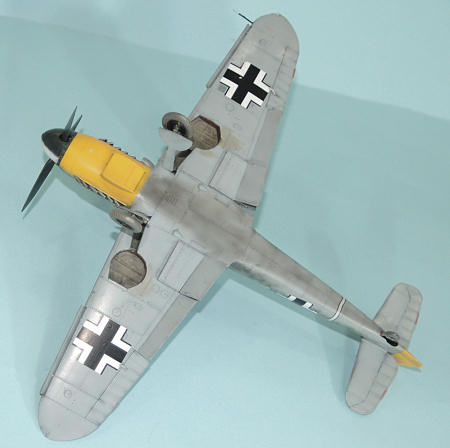 After painting and masking off the yellow areas, I painted the airplane
in the standard Bf-109F camouflage pattern, using Xtracrylix paints.
After painting and masking off the yellow areas, I painted the airplane
in the standard Bf-109F camouflage pattern, using Xtracrylix paints.
I used the national markings from a Lifelike Decals 1/32 Bf-109 sheet.
After putting on the Trumpeter decals for the Gruppenkommandeur chevron
and the Third Gruppe stripe, I saw that the shade of white was significantly
different from that of the insignia; this was where I regretted not getting the
Eagle Cals sheet for this airplane.
However, from a distance behind glass out at Planes of Fame where this is
headed, this will likely not be a problem.
If you want to do it for your personal collection, I highly recommend
getting the Eagle Cal decals.
Photos show this airplane well maintained with no obvious “dings,” so I
weathered it with heavy exhaust staining using Tamiya “Smoke.”
I then attached the prop, landing gear, aileron mass weights, wingtip
lights and canopy.
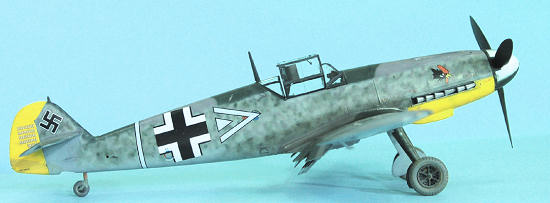 The Bf-109F kit is the best of Hasegawa's 1/32 109 series in my
book, since they corrected the spinner shape many had complained about,
and went to the effort of being sure that the fuselage really was an “F”
fuselage, which no other kit company has done.
This entire series is one of the best in any scale, and a modeler
can do them all with the assurance that assembly will lead to a nice
“canvas” for any camouflage scheme or markings one wishes to create.
This is a limited-run kit and not currently available, but like
the 1/32 P-40K it will likely be re-released in the future, so if you
want it, pay attention to your stocklist.
Hopefully Hasegawa will just release it as a Bf-109F-2 also.
The Bf-109F kit is the best of Hasegawa's 1/32 109 series in my
book, since they corrected the spinner shape many had complained about,
and went to the effort of being sure that the fuselage really was an “F”
fuselage, which no other kit company has done.
This entire series is one of the best in any scale, and a modeler
can do them all with the assurance that assembly will lead to a nice
“canvas” for any camouflage scheme or markings one wishes to create.
This is a limited-run kit and not currently available, but like
the 1/32 P-40K it will likely be re-released in the future, so if you
want it, pay attention to your stocklist.
Hopefully Hasegawa will just release it as a Bf-109F-2 also.
Tom Cleaver
November 2011
Thanks to Hobby Link Japan for the review kit.
If you would like your product reviewed fairly and fairly quickly, please contact the editor or see other details in the
Note to
Contributors.
Back to the Main Page
Back to the Reviews Index Page



 other
with two 20mm MG-FF cannon in the wings, as well as the shallow radiator for the
early Bf-109F. This is the first
time any manufacturer has given modelers the opportunity to create these two
interesting airplanes in 1/32 with parts supplied in the box.
(Hasegawa also released this in 1/48. Ed) As with the
earlier release, it includes the more accurate spinner and more detailed
exhausts, as well as detailed parts for the interior of the windscreen and
canopy.
other
with two 20mm MG-FF cannon in the wings, as well as the shallow radiator for the
early Bf-109F. This is the first
time any manufacturer has given modelers the opportunity to create these two
interesting airplanes in 1/32 with parts supplied in the box.
(Hasegawa also released this in 1/48. Ed) As with the
earlier release, it includes the more accurate spinner and more detailed
exhausts, as well as detailed parts for the interior of the windscreen and
canopy.

 The Bf-109F kit is the best of Hasegawa's 1/32 109 series in my
book, since they corrected the spinner shape many had complained about,
and went to the effort of being sure that the fuselage really was an “F”
fuselage, which no other kit company has done.
This entire series is one of the best in any scale, and a modeler
can do them all with the assurance that assembly will lead to a nice
“canvas” for any camouflage scheme or markings one wishes to create.
This is a limited-run kit and not currently available, but like
the 1/32 P-40K it will likely be re-released in the future, so if you
want it, pay attention to your stocklist.
Hopefully Hasegawa will just release it as a Bf-109F-2 also.
The Bf-109F kit is the best of Hasegawa's 1/32 109 series in my
book, since they corrected the spinner shape many had complained about,
and went to the effort of being sure that the fuselage really was an “F”
fuselage, which no other kit company has done.
This entire series is one of the best in any scale, and a modeler
can do them all with the assurance that assembly will lead to a nice
“canvas” for any camouflage scheme or markings one wishes to create.
This is a limited-run kit and not currently available, but like
the 1/32 P-40K it will likely be re-released in the future, so if you
want it, pay attention to your stocklist.
Hopefully Hasegawa will just release it as a Bf-109F-2 also.